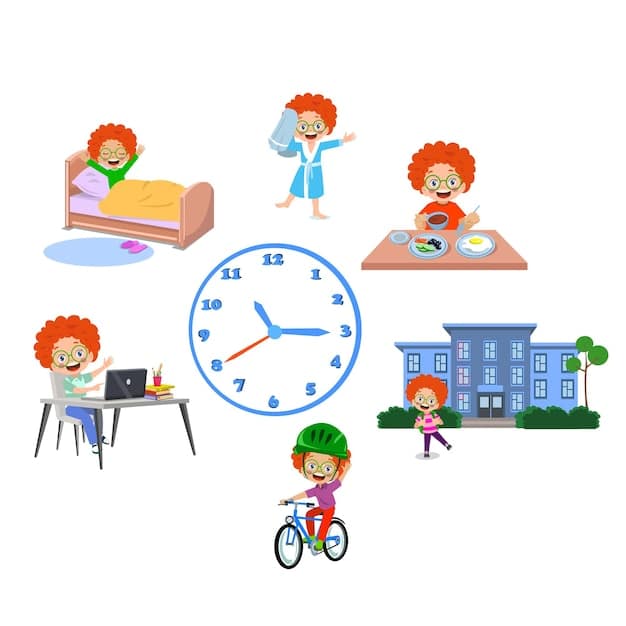Is Your Child’s Sleep Schedule Sabotaging School Performance?

Is Your Child’s Sleep Schedule Sabotaging Their School Performance? Find Out Now: A consistent and age-appropriate sleep schedule is crucial for children’s academic success, impacting their cognitive functions, mood, and overall well-being, so addressing sleep issues can lead to improved school performance.
Are you worried that your child isn’t performing as well as they could in school? The culprit might be something as simple as their sleep schedule. Is Your Child’s Sleep Schedule Sabotaging Their School Performance? Find Out Now, you will understand how sleep impacts every aspect of child’s life.
The Undeniable Link Between Sleep and School Performance
Sleep is a fundamental pillar of health, influencing everything from mood and behavior to cognitive function and physical development. For school-aged children, adequate sleep is not just about feeling rested; it’s a crucial ingredient for academic success.
A child who consistently gets enough sleep is better equipped to handle the demands of school, from paying attention in class to retaining information and completing assignments. When sleep is lacking, the consequences can be significant.
The Impact of Sleep Deprivation on Cognitive Function
Sleep deprivation can impair various cognitive functions essential for learning. Here are some key areas affected:
- Attention Span: Lack of sleep makes it harder to focus and concentrate in class, leading to missed information and poor engagement.
- Memory Consolidation: Sleep is crucial for transferring information from short-term to long-term memory. Without enough sleep, it becomes challenging to remember what was learned.
- Problem-Solving Skills: Adequate sleep enhances the ability to think critically and solve problems effectively. Sleep-deprived children may struggle with complex tasks.
- Decision-Making: Poor sleep can impair judgment and decision-making abilities, impacting choices made in and out of the classroom.

In short, sufficient sleep is essential for the brain to function at its best. When children are consistently sleep-deprived, their cognitive abilities suffer, hindering their academic performance.
Recognizing the Signs of Sleep Deprivation in Children
Identifying sleep deprivation in children can be tricky, as symptoms may vary depending on age and individual differences. However, some common signs can indicate a sleep problem.
Pay attention to your child’s behavior, mood, and physical well-being. If you notice several of these signs, it may be time to take a closer look at their sleep habits.
Common Symptoms of Sleep Deprivation
Look out for these common symptoms of sleep deprivation in your child:
- Difficulty Waking Up: Struggling to get out of bed in the morning, even after a full night.
- Daytime Sleepiness: Excessive yawning, feeling tired throughout the day, or nodding off in class.
- Irritability and Mood Swings: Increased irritability, frustration, or emotional outbursts.
- Behavioral Problems: Difficulty following instructions, hyperactivity, or impulsivity.
Recognizing these signs early can help you address sleep issues before they significantly impact your child’s school performance.
Establishing a Consistent Sleep Schedule
One of the most effective ways to improve your child’s sleep is to establish and maintain a consistent sleep schedule. This means going to bed and waking up at the same time every day, even on weekends.
A regular sleep schedule helps regulate the body’s natural sleep-wake cycle, also known as the circadian rhythm. When this rhythm is disrupted, it can lead to sleep problems and daytime fatigue.

Tips for Creating a Sleep Schedule
Here are some practical tips for creating and sticking to a sleep schedule:
- Set Consistent Bedtimes and Wake Times: Choose bedtimes and wake times that align with your child’s age and ensure they get enough sleep.
- Create a Relaxing Bedtime Routine: Establish a calming routine that helps your child wind down before bed, such as reading, taking a warm bath, or listening to soothing music.
- Avoid Screen Time Before Bed: The blue light emitted from screens can interfere with sleep. Encourage your child to avoid using electronic devices at least an hour before bedtime.
- Make the Bedroom Sleep-Friendly: Ensure the bedroom is dark, quiet, and cool. Use blackout curtains, a white noise machine, or a fan to create a comfortable sleep environment.
By implementing these strategies, you can help your child establish a consistent sleep schedule and improve their overall sleep quality.
The Role of Diet and Exercise in Promoting Better Sleep
In addition to a consistent sleep schedule, diet and exercise play significant roles in promoting healthy sleep habits. What your child eats and how active they are can impact their sleep quality.
Encouraging a balanced diet and regular physical activity can contribute to better sleep and improved school performance.
Dietary Recommendations for Better Sleep
Consider these dietary recommendations to promote better sleep:
- Limit Caffeine and Sugar: Avoid giving your child caffeinated beverages or sugary snacks, especially in the afternoon and evening. These can interfere with sleep onset and quality.
- Offer a Nutritious Dinner: Serve a well-balanced dinner that includes lean protein, whole grains, and vegetables. Avoid heavy, greasy foods that can disrupt sleep.
- Consider a Bedtime Snack: A small, healthy snack before bed, such as a banana or a glass of warm milk, can promote relaxation and sleep.
A healthy diet provides the building blocks for restful sleep. Be mindful of what your child consumes, especially in the hours leading up to bedtime.
Addressing Underlying Sleep Disorders
In some cases, sleep problems may be caused by underlying sleep disorders such as sleep apnea, insomnia, or restless legs syndrome. These conditions can significantly disrupt sleep and impact daytime functioning.
If you suspect your child has a sleep disorder, it’s essential to seek professional help. Early diagnosis and treatment can improve sleep quality and overall well-being.
When to Consult a Healthcare Professional
Consider consulting a healthcare professional if your child:
- Snores Loudly or Pauses Breathing During Sleep: These could be signs of sleep apnea.
- Has Difficulty Falling or Staying Asleep: This may indicate insomnia.
- Experiences Uncomfortable Sensations in the Legs: This could be restless legs syndrome.
Consulting a healthcare professional can help in the early diagnosis and treatment, which in turn improves sleep quality and overall wellbeing.
Creating a Relaxing Bedtime Routine
A soothing bedtime routine signals to the body that it’s time to wind down and prepare for sleep. A consistent routine can make it easier for your child to fall asleep and stay asleep throughout the night.
Incorporate calming activities that your child enjoys and that promote relaxation. This can create a positive association with bedtime and make it a more enjoyable experience.
Elements of a Successful Bedtime Routine
Here are some key elements to include in a successful bedtime routine:
- Dim the Lights: Lower the lights in the house to signal the body to produce melatonin, a hormone that promotes sleep.
- Read a Book Together: Reading aloud can be a calming and bonding experience. Choose age-appropriate books that are not too stimulating.
- Take a Warm Bath: A warm bath can help relax muscles and lower body temperature, promoting sleepiness.
- Practice Relaxation Techniques: Teach your child simple relaxation techniques such as deep breathing or progressive muscle relaxation.
By establishing a relaxing bedtime routine, you can create a peaceful transition to sleep and improve your child’s overall sleep quality.
| Key Point | Brief Description |
|---|---|
| ⏰ Consistent Schedule | Regular bed and wake times improve sleep quality. |
| 🌙 Relaxing Routine | A calming routine signals the body to prepare for sleep. |
| 🥦 Healthy Diet | Avoid caffeine and sugar, offer a nutritious dinner. |
| 🩺 Professional Help | Consult if you suspect sleep disorders. |
Frequently Asked Questions
▼
Sleep requirements vary by age. School-aged children (6-12 years) typically need 9-12 hours, while teenagers (13-18 years) require 8-10 hours of sleep per night for optimal performance.
▼
Signs include difficulty waking up, daytime sleepiness, irritability, difficulty concentrating, and behavioral problems. Monitor your child’s behavior and mood for these indications.
▼
Make sure the room is dark, quiet, and cool. Use blackout curtains, a white noise machine, or a fan to create a comfortable sleep environment conducive to restful sleep.
▼
Yes, definitely. The blue light emitted from screens can interfere with sleep. Encourage your child to avoid using electronic devices at least an hour before bedtime for better sleep.
▼
Consult a healthcare professional if your child snores loudly, pauses breathing during sleep, has difficulty falling or staying asleep, or experiences uncomfortable sensations in the legs.
Conclusion
Ensuring your child gets enough sleep is one of the most impactful things you can do to support their academic success. By understanding the critical link between sleep and school performance, recognizing the signs of sleep deprivation, and implementing strategies to improve sleep habits, you can set your child up for success in the classroom and beyond. Prioritize sleep, and watch your child thrive!





